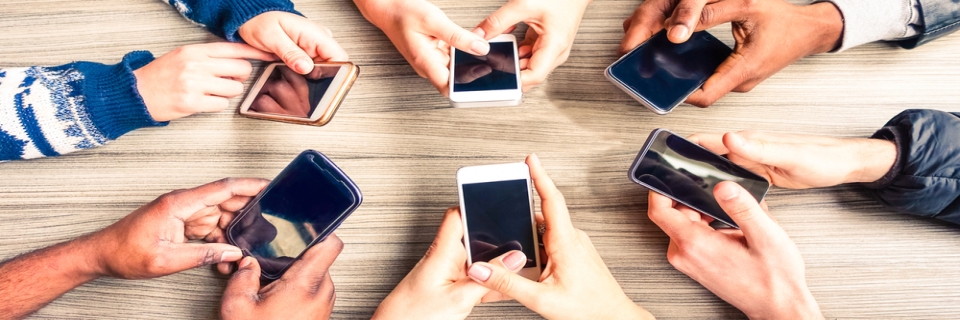In our July meeting we talked about online networks. Almost everyone now does loads online – much more.
Socialising, shopping, watching TV shows and films, banking and bills – even doing your tax return. Many people use TripAdvisor, Airbnb and Amazon reviews to make decisions.
Even if you personally prefer some offline things – meeting friends for a meal etc, as businesses we need to think about our customers and what they are using and how best to communicate.
What are people doing online and why?
Connecting and building communities?
Connecting people with similar interests who aren’t local to each other but have something in common
- Sites like Mumsnet and Netmums for parents and families
- LinkedIn groups for professionals in a similar field
Keeping people connected who know each other in ‘real life’
- Whatsapp groups
- Snapchat
- Gaming
Helping people who are geographically close to each other to get to know each other, help each other and build a ‘real life’ community
- Facebook community groups
- Sites like borrowmydoggy.com, liftshare.com or streetbank.com
- Meetup.com
Recruitment / Procurement
Perhaps finding more efficient ways of doing things.
Marketing
New customers – finding and building relationships.
Buying and shopping
- 80% of B2B buying decisions involved online
- Product range/pricing, experience and expertise
- Quick access – Online is more efficient full range, delivery.
- Reviews Airbnb, TripAdvisor, Trust Pilot, Feefo
- Influencers
Reviews
The Shed restaurant in Dulwich was just a listing created by a freelance writer, Oobah Butler, who used his home – a shed in Dulwich in south London – as the inspiration for a high-concept new restaurant: “The Shed at Dulwich.” With hardly more than some fake reviews and a website, it had climbed the site’s ratings in one of the world’s food capitals.
Should we be asking whether we rely on reviews too much and are they authentic? Who is leaving these reviews and are they trustworthy? Are we are letting these reviewers become part of our online social network?
How do businesses deal with bad reviews? How can businesses encourage good reviews?
Do we all need to be a bit sceptical?
Influencers
Online networks have also created social media influencers. In recent years, brands have been using so-called "influencers" – fitness gurus, gaming addicts, beauty bloggers, fashionistas and others – as the face of their advertisements. Influencers' take advantage of their social capital and endorse opinions about products, which are shared on social media platforms, help spread viral conversations about brands online
Some well known influencers we looked at:
- Zoella – UK fashion and beauty blogger. 40 million fans over her social media channels. She had some negative press over Christmas when a beauty advent calendar she endorsed with Boots was not perceived to be value for money.
- Felix Kjellberg (aka PewdiePie) – Swedish Gamer. 53 million subscribers on YouTube. He was alleged to have been anti-Semitic in some of his videos and images and his sponsorship deal with Disney was severed.
- Logan Paul US vlogger with 16 million Instagram followers – posted a controversial suicide video on YouTube and faced a backlash.
- Kylie Jenner – Reality TV personality, CEO of a makeup company and member of the Kardashian-Jenner family. 108 million Instagram followers. Has her own company but also sponsorship deals with other big brands. Back in February she tweeted that she was no longer using Snapchat and just one day later Snapchat’s stock price dropped over a million dollars.
- Clemmie Hooper – midwife with 500,000 Instagram followers. Shot to fame for her musings on being a parent of 4 daughters. She was accused of exploiting her children and posting ‘ethically dubious’ pictures and stories of her family life.
There are pros and cons of using influencers as part of your marketing strategy. Last February Elle Darby a YouTuber wrote to a Dublin Hotel asking for free accommodation for her and her partner in exchange for publicity. The manager responded with disdain, but the subsequent publicity reached 20 countries and potentially 450 million people. Her YouTube subscribers and Instagram followers increased in the thousands, so even that ‘spat’ generated publicity for her and the Hotel.
Something like this shows how people are leveraging their social capital and making it into a ‘business’ or a money making opportunity.
Online networks can influence the macro environment
- US elections
- Brexit
Internet challenges
Are we connecting or is it an echo chamber?
Back in the early 2000s the US legal scholar Cass Sunstein offered a stark warning.
“Although millions of people are using the Internet to expand their horizons, many people are doing the opposite, creating a Daily Me that is specifically tailored to their own interests and prejudices,”
They would, in effect, live in ‘echo chambers’, leading to greater polarisation in a country’s politics.
Can our use of online social networks mean that we can be manipulated or only read things or connect with things that social media channels thing we will like based on our information and personal searches.
Fake News
Fake news is not new however it has become a hot topic.
Many people now get news from social media sites and networks and often it can be difficult to tell whether stories are credible or not.
Social media sites can play a big part in increasing the reach of these type of stories.
Google and Facebook have announced new measures to tackle fake news with the introduction of reporting and flagging tools. Media organisations like the BBC and Channel 4 have also established fact checking sites.
Donald Trump relies on Twitter to communicate with people, rather than traditional news outlets citing the rise of ‘Fake News’ so can online networks combat as well as create Fake News? Whatever the answer is, they have changed how we find out about what is happening in the world forever.
What should we do differently in our businesses – what can we learn from it?
Publicity:
- How quickly good and bad publicity can spread.
- How do we deal with the bad publicity if it happens to our business?
- Can we leverage the power of our networks to create some good publicity for our business?
- Should we ‘spread the love’ and leave a positive review or endorsement?
Internal issues, like recruitment or finding suppliers.
- Do our online networks give us an advantage to do things more efficiently or for better value?
Macro Environment
- We don’t operate in a vacuum – we’re all effected by the political and economic climate we live in
- In the days of online media and fake news businesses can’t afford to be complacent about the status quo. Who would have thought Brexit would have happened, or Trump coming to power? We need to be aware and agile.
Leveraging Influencers
- Influencers are powerful, and can give a business a lot of good publicity.
- It’s a new way of advertising and you need to make sure you are abiding by advertising regulations.
Learn from the influencers and allow an authentic view in.
- People like Kylie Jenner or Mark Zuckerberg both are social media presences outside of their businesses. They are individuals with their own distinct personalities and views and everything they do funnels publicity towards their businesses.
- We can’t all be billionaire CEOs but showing the world you are a person just like everyone else helps you create a bond with potential customers and clients. It humanises you and makes you stand out.
In summary
- We can’t ignore online networking – it’s here to stay.
- It can give us an amazing opportunity to maintain our connections with people and build communities and learn.
- It shouldn’t replace real life and face to face connections, just make it better and easier.













